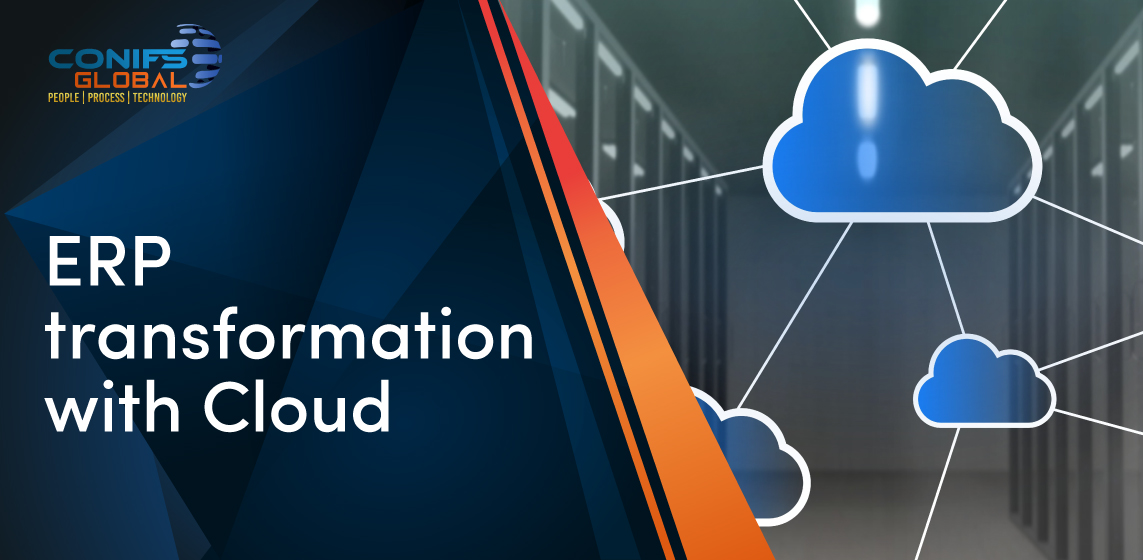Business world is continuously improving in order to make the things easier quicker and cost effective. The cloud technology is also such technological invention which pitched in the IT industry to serve business needs. Businesses are increasingly using cloud solutions to integrate their various systems. ERP (Enterprise Resource Planning) is becoming a more popular cloud solution for small and medium sized businesses (SMBs).
Cloud-based ERP is an enterprise resource planning software that can be accessed via the Internet. All cloud-based ERP software supports basic business functions. It efficiently automates essential business workflow across multiple industries. Basic functions like finance and accounting, human resource management, marketing, customer relationship management and supply chain management functions are some common functions facilitated through ERP. In general, cloud ERP solutions offer a more efficient approach by allowing businesses to take advantage of vast computing power. Shifting to cloud ERP generally offers lower upfront costs, faster implementation and reduced physical and staff resource usage. There are many benefits and reasons why companies are switching from on-premises to cloud ERP. Some of them are,
Lower costs
The initial cost of implementing cloud ERP software is significantly lower than on-premises systems, which can reduce existing costs and thus avoid the need for large-scale capital.
It not only saves capital costs, but also reduces operating costs by eliminating the need for hardware configuration and software upgrades, system management, and performance management compared to on-premises ERP.
Security
Customer or the ERP user can experience higher security with the cloud technology. The security of cloud-based software is often better than the security of on-premises ERP systems. In addition, ERP cloud servers are located in secure and centralized facilities, reducing the risk of physical theft. Cloud ERPs providers focus a lot of their efforts on avoiding downtime and having robust power backups and fail-safes in place.
Implementation
Cloud solutions can be configured and deployed much faster than on-premises systems. These systems are specifically aimed at creating highly responsive, adaptable, and easy-to-implement solutions.
Improved accessibility, collaboration, and agility
Cloud ERP offers improved accessibility, usability, and mobility Compared to on-premise ERPs. Using cloud-based ERP allows for more corporate agility which means employees can easily access the tools they need from anywhere, anytime via the internet. It also gives access to real-time information and provides insights into the status of all processes and data.
Reduce dependency and free up internal IT teams
Moving to a cloud-based ERP can have a major impact on company’s internal IT team. This is especially useful for small businesses to get the most out of their IT team also companies who do not have an IT sector can run smoothly without making these additional investments.
Scalability
Companies are having varying requirements for handling data. It could be seasonal or periodical. Adding new hardware and networking is a main part of expansion when it comes to on-premises ERP expansion. This is time consuming and costly. But cloud ERP systems are much more flexible hence easy to adopt with the demand and available to increase and decrease the capacity on incremental cost basis.
Access to emerging technology
Technology is rapidly evolving today. With the advancement of technology, the competitiveness of companies has also increased. Advanced analytics, artificial intelligence, machine learning, and other technological advancements enable the use of massive volumes of data. They can improve forecasting accuracy, discover hidden insights, improve productivity, and offer innovative products. Cloud ERP allows taking advantage of this prominent technology more efficiently and cost-effectively. The service already includes Artificial intelligence, machine learning, analytics, and other business intelligence technologies. This means that businesses can benefit without the physical infrastructure, expenditures, or technical talent that on-premises systems require.
Real-time data
Cloud based ERP provides real-time data better than traditional systems. The possibilities of inaccurate data are reduced when bottlenecks at various software integration points are removed. Hence, the information given is always up to date because the applications and information are hosted in a central cloud location.
Easier customization
Configuring on-premises ERP systems to match the company objectives is more expensive and needs more time and IT resources than cloud-based ERP. This involves integrating the relevant ERP features with third-party applications and performing any necessary software and hardware upgrades.
– Nisandi Nethmani





